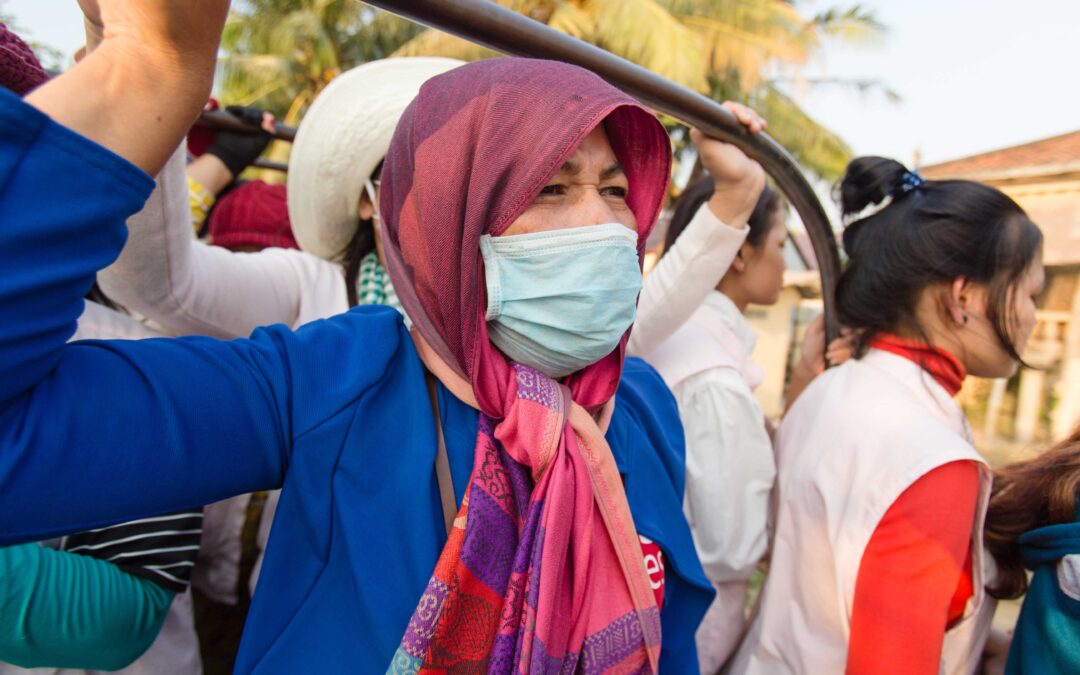
Jun 1, 2021
Half or more workers in key Cambodian industries were suspended for three or four months, and most were unable to support themselves on government aid during the pandemic, according to a new study that put hard data to the suffering of the country’s low-wage workers.
Some 53 percent of those working in tourism were suspended for an average 15 weeks, and 40 percent of workers in Cambodia’s garment and footwear industries were suspended for an average of 11 weeks, according to a survey of 1,525 workers by the Center for Policy Studies. Solidarity Center and The Asia Foundation supported the research, which reports results from July and August 2020. (See the full survey.)
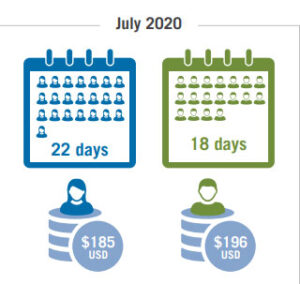
Women workers in Cambodia worked more and were still paid less than men during the pandemic. Source: CPS/Solidarity Center/Ponlok Chomnes
Women comprise the majority of workers surveyed and are the majority of 800,000 workers in the country’s garment and footwear industries. Before the pandemic, women were typically paid less than men. Yet, even when they returned to work in July 2020, they reported being paid less than men even though they worked more days than men.
All workers who returned to the job by July 2020 on average were employed for fewer hours and earned less than in July 2019.
COVID-19 an Excuse to Exploit Workers
Although many businesses were forced to temporarily suspend operations or shutter permanently during Cambodia’s first wave of COVID-19, some employers took advantage of the pandemic to lay off workers, union leaders say.
Further, hospitality and garment workers who returned to, or remained on the job, were not provided adequate personal protective equipment (PPE) or measures to ensure their safety, according to union leaders in Cambodia. Unions have been organizing to hold employers to account, negotiating for better protection measures.
Government Support Helpful, Not Sufficient
To assist garment and tourism workers during the country’s first wave of COVID-19, the Cambodian government launched several programs, including financial support for workers suspended from the job and a skills improvement training program. But workers interviewed for the survey said the suspension payments, which ranged $40 to $70 per month, were not sufficient to cover the roughly $69 they needed for basic monthly food expenditures.
Half of those surveyed say the suspension allowance was their only income, and more than 50 percent said they could not afford to send remittances to their family as a result of pandemic-related losses. Between 40 percent and 60 percent of workers surveyed say they took on debt to survive.
The government announced in July 2020 that businesses closed during COVID-19 were not required to pay workers hardship or layoff wages. Tourism sector operations also were not required to contribute the $30 per month toward the suspension payments. The government provided $40 per month.
Urgent Action Needed for New Pandemic Wave
Since February, Cambodia has experienced its worst COVID-19 outbreak, which has led to a deepening crisis for workers as many major cities and several provinces have been in strict lockdown.
During the pandemic, workers in many industries have been left out of public social protection programs, such as health coverage, and the survey recommends extension of these benefits for the most vulnerable.
The survey also recommends expanding skills improvement training programs and funding opportunities for temporary jobs.
Without such support, garment workers like Eang Malea are returning to their factories despite the risk of contracting COVID-19.
“I need to pay rent, utilities and debts, ” Malea, 26, said. “I worry that I will get infected by going to work without being vaccinated, but I don’t really have a choice.”
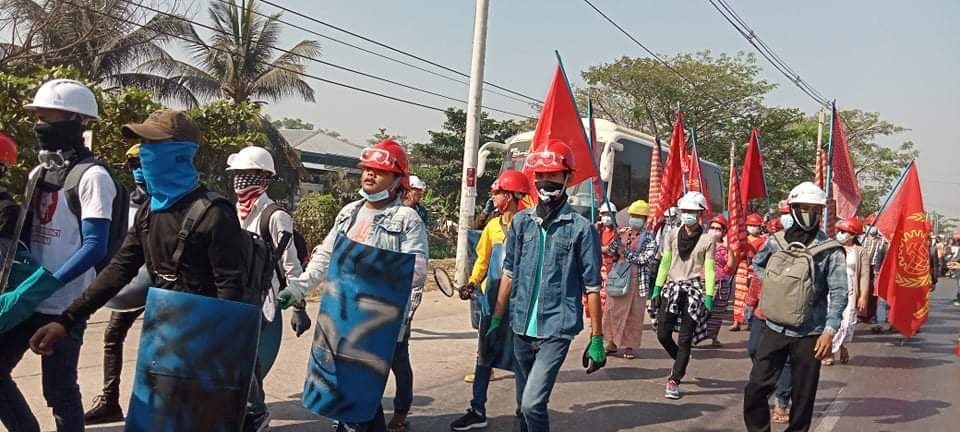
Mar 19, 2021
At least two union members were confirmed killed by the Myanmar military this week and at least six workers were shot dead at the Xing Jia shoe factory in the Hlaing Thar Yar industrial zone Tuesday, according to union leaders. The factory workers, including the woman leader, were shot after the employer called the police when they demanded unpaid wages. Seventy workers were arrested and loaded onto two prisoner trucks.
Union leaders say the police and military violence against protesters in the industrial zones is much worse than is being reported because nationwide internet service repeatedly has been cut, including on Sunday before a violent crackdown.
Also this week, one union leader from the Federation of General Workers Myanmar (FGWM) was arrested while walking to the FGWM office but was released later that night.
Workers Targeted for Standing Up for Democracy
Workers, especially women, have taken a leading role in the civil disobedience movement (CDM) that began February 1, following the military ouster of elected officials, including leader Aung San Suu Kyi. At least 217 people have been killed.
Garment workers, led by women union leaders, have demanded global corporate fashion brands tell factory owners to respect workers’ rights, including the freedom to freely express themselves and peacefully gather.
The Confederation of Trade Unions-Myanmar (CTUM) is requesting international financial institutions freeze all activities in Myanmar, saying all activities with government ministries translate as support for the coup. The CTUM also is calling on companies to protect and respect freedom of association and the rights to assemble and peacefully protest and must help ensure that no worker or union leader will be punished for joining the CDM.
The military is now targeting workers on several fronts, moving into industrial zones and declaring martial law. The military also issued a public statement that public-sector workers must return to work by Monday or they will be criminally charged.
Nearly all factories in the Yangon area, including in major industrial zones, have closed, and union leaders report a mass exodus of factory workers from the industrial zones to their hometown rural villages.
The military is asking factory owners to disclose the names and addresses of trade union leaders to arrest them, and soldiers are going door to door in the worker dormitories and hostels in a bid to find them, according to Khaing Zar Aung, president of the Industrial Workers Federation of Myanmar (IWFM).
Key union leaders of CTUM and affiliated unions were forced into hiding after the military issued a secret list of 27 trade union leaders to be persecute, she writes.
The global labor movement has condemned the military coup, including the International Trade Union Confederation, AFL-CIO and IndustriALL, which called for the immediate restoration of democracy.
Feb 18, 2021
“The accident took place earlier this month, in a factory that employs 130 workers, mostly women. The illegal factory is said to have been operating for 20 years. Labor groups including U.S.-based Solidarity Center, are campaigning for an investigation into the tragedy.”
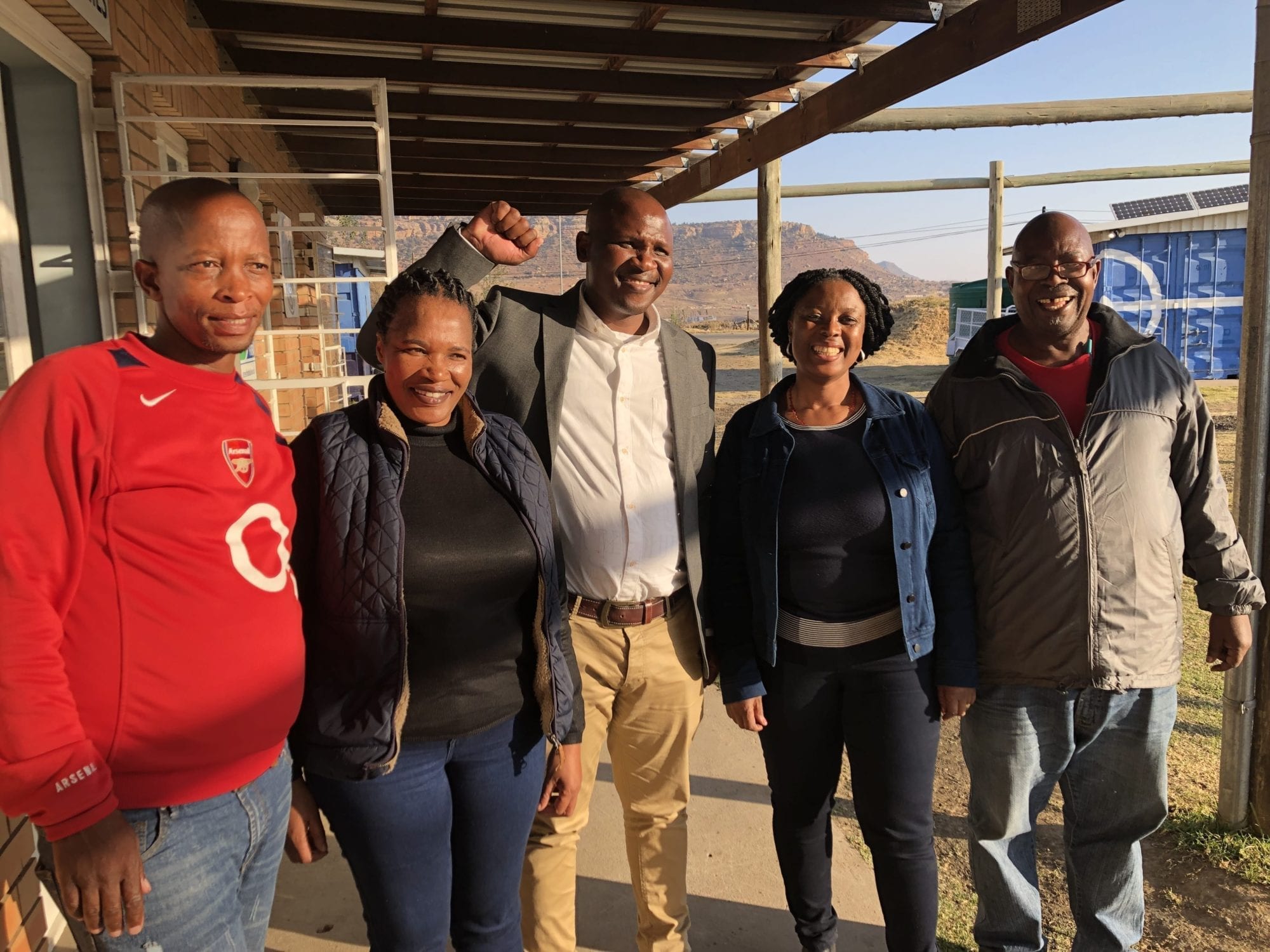
Feb 8, 2021
A worker-centered, precedent-setting program that targets gender-based violence and harassment (GBVH) in four Lesotho garment factories is now in effect for as many as 10,000 workers producing jeans for the global market.
The program inauguration on Friday was marked by a social media campaign, including SMS text blasts to garment workers, Lesotho-based media coverage and a video announcement by signatories to binding 2019 agreements—the factory owner, brands, local unions and women’s rights groups, and international organizations and unions, including the Solidarity Center, Workers United, and the Worker Rights Consortium. The program, which is unique in that it is binding and worker-led, will empower Lesotho unions, human and women’s rights groups to effectively address GBVH. One of its tools is a new Solidarity Center GBVH training video in English and Sesotho, which debuted on Friday, that will be widely disseminated to garment workers during training programs and via social media.
To combat widespread abuse, the program is providing garment workers with GBVH awareness trainings, a confidential reporting system and enforcement processes administered by an entity independent of employer influence. Under the program:
- Workers’ Rights Watch, an independent Lesotho-based nonprofit entity established by the agreements, is fully empowered to investigate complaints of GBVH and determine remedies to redress violations of the agreements’ GBVH code of conduct.
- A confidential, toll-free information line run by one of the women’s rights organizations is available six days a week for garment workers to discuss GBVH issues and remedies with trained counselors, including determining their rights under the code of conduct and how to participate safely in a complaint and remedy process.
- Education and awareness campaigns and programs are being provided to garment workers and their supervisors that get at the root causes of gender discrimination and violence against women, outline the GBVH code of conduct and remedies under the program, and encourage reporting through the information line.
“Painful occurrences have been happening at our place of work,” said Nien Hsing shopfloor union representative ‘Mamoleboheng Mopooane, describing demands by supervisors for sexual favors from workers seeking employment at the factory gate in exchange for work in previous years.
“We are really grateful for this program because before it has even [officially] started, we can see that there are already existing successes,” she said, adding that the program will be of even greater assistance once workers know where to report violence and harassment, and can see that GBVH incidents are taken seriously.
Program partners include Lesotho-based unions and women’s rights groups that will play a key role in implementing the program to ensure that the binding agreements change the culture and practice at Nien Hsing’s factories and provide remedy for victims of GBVH. These include the Federation of Women Lawyers in Lesotho (FIDA), the Independent Democratic Union of Lesotho (IDUL), the National Clothing Textile and Allied Workers Union, Lesotho (NACTWU), the United Textile Employees (UNITE) and Women and Law in Southern Africa Research and Education Trust (WLSA)-Lesotho; international rights organizations Solidarity Center, Worker Rights Consortium (WRC) and Workers United. Global brands Levi Strauss, The Children’s Place and Kontoor Brands and the employer Nien Hsing are signatories to and participants in the binding agreements and GBVH program. Funding comes from Levi Strauss, The Children’s Place and Kontoor Brands together with the Solidarity Center and WRC in collaboration with the U.S. Agency for International Development (USAID).
A 2019 survey of workers at three Nien Hsing factories in Lesotho by WRC, which spurred the agreements, found that nearly two-thirds of the women from three factories who were interviewed reported “having experienced sexual harassment or abuse” or having knowledge of harassment or abuse suffered by co-workers. Women workers from all three factories surveyed identified GBVH as a central concern for themselves and other female employees.
The agreements build on the Bangladesh Accord on Fire and Building Safety, in which unions were key participants. The Accord recognizes the fundamental role of collective bargaining in achieving an agreement that is binding and enforced, backed by international brands’ commitment to link their ongoing business with their supplier to their compliance.
The Lesotho GBVH program also is partially modeled after the Fair Food Program, a set of binding agreements between leading food brands, like McDonald’s and Whole Foods, and the Coalition of Immokalee Workers, which uses an independent complaint mechanism.
While sexual harassment and other forms of gender-based violence may happen at any workplace, GBVH is rampant in the global garment and textile industry.
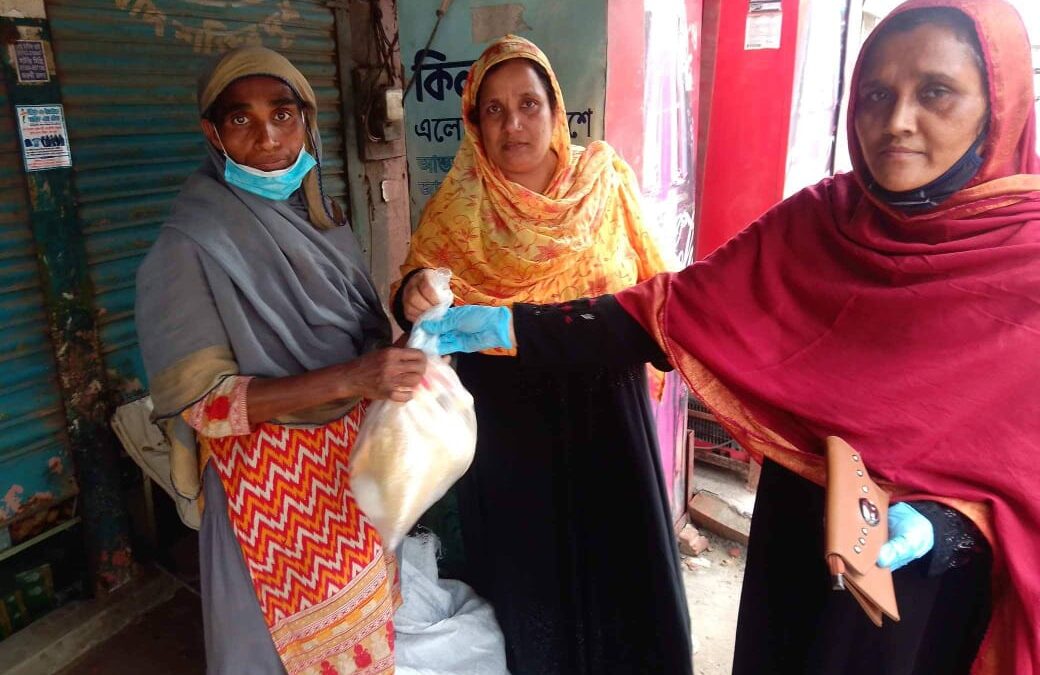
Dec 10, 2020
As garment factories shut down in Bangladesh during the novel coronavirus pandemic, leaving workers without wages or access to support services, unions and Worker Community Associations (WCAs) around the country rapidly shifted to address the crisis, with Worker Community Centers (WCC) serving as a lifeline for workers, their families and their communities.
The community associations and centers are part of an ongoing USAID-funded Solidarity Center Workers’ Empowerment and Participation project (WEP) launched in 2019 to improve working conditions for workers in the ready-made garment and shrimp and fish processing sectors in Bangladesh. The project builds on the strong foundation WEP established between 2015 and 2019.
In July, the Solidarity Center delivered 30,000 COVID-19 awareness leaflets to its partners in Dhaka and nearby Ashulia, Gazipur, Narayanganj and Savar; as well as Chattogram, Jashore and Khulna. The pamphlets, distributed to thousands of workers and community members by WCC coordinators and union federation organizers, highlight key safety measures during the COVID-19 pandemic, such as proper hand washing, social distancing and wearing masks at all times when outside the home.
“It’s important for us to do our part to get accurate information to everyone in the community to help stop the spread of this deadly virus,” says Rita Saha, WCC coordinator in Rupsha. “Our WCC leaders and members have extensive networks, and we love raising awareness and helping our community.”
Ensuring Fair Wages, Decent Working Conditions
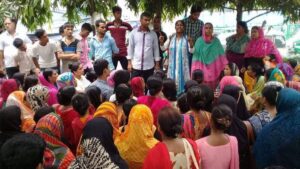
When AFCO garment factory closed during COVID-19, workers received unpaid wages due to their union’s efforts. Credit: Solidarity Center
Even as WCCs and unions distributed resources, including food baskets to families of furloughed garment workers during Ramadan, they carried on the crucial work of ensuring workers receive fair pay during factory shutdowns.
As AFCO Abedin Garments Ltd. got set to permanently close in April without paying workers’ back wages, the Garments Workers Solidarity Federation (GWSF) launched negotiations with management and encouraged the Department of Inspection for Factories and Establishments and the Bangladesh Garment Manufacturers and Exporters Association to intervene. Ultimately, factory management agreed to pay the workers 60 percent of their April salary, one month’s base salary and 60 percent of the base wage for each full year of service. Eligible workers also will receive seven days’ annual leave.
In June, Hop Lun Apparels Ltd., Sammilito Sramik Union (HLALSSU) successfully negotiated a 24-point collective bargaining agreement with factory management covering more than 2,000 workers.
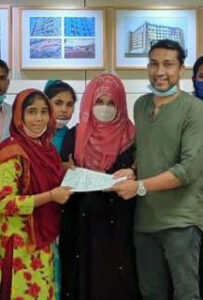
Union members at Hop Lun garment factory negotiated a contract that addresses gender-based violence at work. Credit: Solidarity Center
“When we submitted demands and negotiated with management, we gave special emphasis on the issues of women,” says Aklima, factory union president. “The guarantee of promotion of women to higher posts and the establishment of sexual harassment committee will empower the women and provide safeguards against sexual abuse and harassment in our factory.”
Training, Legal Support
The Workers’ Empowerment and Participation program also carried out leadership training and legal support that included advising more than 450 workers and winning $10,835 in court for 41 workers. Additional accomplishments over the past year include:
- 27,213 workers covered by unions in more than 200 factories
- 104 women elected to leadership positions
- 2,209 new community members actively participating in Worker Community Associations
- 21 new unions and worker-driven organizations in the garment and shrimp processing sectors and 12 new garment unions registered
- 39 worker-leaders trained in achieving gender equality or women’s empowerment at public and private organizations
“The WCC training sessions helped make me more confident and brave, and have helped me understand gender-based violence and harassment,” says one woman garment worker. “This has made it easier for me to handle tough situations at my workplace and in the community.”
Find out more about the Workers Empowerment Project.







